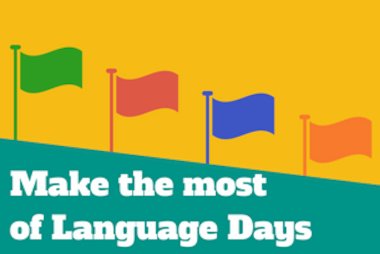Our Favourite MFL Idioms
In celebration of European Day of Languages on September 26th, we’ve gathered together a few of our favourite idioms in multiple European languages. Some may be familiar to you – for example, several languages have their own version of ’it’s raining cats and dogs’. In French it rains ropes (il pleut des cordes_), in Greek it rains chair legs (βρέχει καρεκλοπόδαρα_) and in Czech it rains wheelbarrows (Padají trakaře)!
Why not ask your class to find their own favourite target language idioms, and add them all to a list? We’ll get you started:
Spanish: ser pan comido
Literally: ‘to be bread eaten’
English equivalent/meaning: to be a piece of cake, really easy to do.
Spanish: más perdido que un pulpo en un garaje
Literally: ‘more lost than an octopus in a garage’
English equivalent/meaning: to be totally and completely lost.
Spanish: aquí hay gato encerrado
Literally: ‘there is a locked up cat here’
English equivalent/meaning: that something fishy is going on.
French: arriver comme un cheveu sur la soupe
Literally: ‘to arrive like a hair in a soup’
English equivalent/meaning: to arrive at the worst, most awkward moment.
French: Coûter les yeux de la tête
Literally: ‘to cost the eyes in your head’
English equivalent/meaning: to cost an arm and a leg, to be very expensive.
French: Tomber dans les pommes
Literally: ‘to fall into the apples’
English equivalent/meaning: to faint, pass out.
German: um den heißen Brei herumreden
Literally: ‘to talk around the hot porridge’
English equivalent/meaning: to beat around the bush, to avoid saying what you really mean to say
German: Tomaten auf den Augen haben
Literally: ‘to have tomatoes on one’s eyes’
English equivalent/meaning: to be unaware of what is happening, to be oblivious.
German: Wo sich Fuchs und Hase gute Nacht sagen
Literally: ‘where fox and rabbit say goodnight to each other’
English equivalent/meaning: in the middle of nowhere.
Greek: κάνει την πάπια
Literally: ‘doing the duck’
English equivalent/meaning: pretending not to be aware of something they know, often to avoid blame.
Greek: σαν ταύρος σε υαλοπωλείο
Literally: ‘like a bull in a china shop’
English equivalent/meaning: Unlike in English where this idiom suggests clumsiness, in Greek the meaning is more towards ‘outraged to the point of smashing nearby objects’.
Polish: Nie mój cyrk, nie moje małpy
Literally: ‘not my circus, not my monkeys’
English equivalent/meaning: not my problem.
Icelandic: Ég tók hann í bakaríið
Literally: ‘I took him to the bakery’
English equivalent/meaning: I told him off.
Swedish: Det är ingen ko på isen
Literally: ‘there is no cow on the ice’
English equivalent/meaning: there is no need to worry.
Dutch: Iets voor een appel en een ei kopen
Literally: ‘buying something for an apple and an egg’
English equivalent/meaning: buying something very cheaply.
Portuguese: Sorriso amarelo
Literally: ‘yellow smile’
English equivalent/meaning: an insincere smile.
Romanian: a freca menta
Literally: ‘to rub mint’
English equivalent/meaning: to do nothing, to waste time.
Italian: Affogare in un bicchier d’acqua
Literally: ‘to drown in a glass of water’
English equivalent/meaning: to make a mountain out of a molehill, to turn little problems into huge disasters.
Similar Posts
-

Best MFL Choices on Netflix
Check out our pick of the best foreign-language tv shows and films available on UK Netflix.
-

Making the most of Language Days
To celebrate Europe Day, we asked you how you have celebrated important days in your classroom and you gave us some fantastic answers. We’d like to share some of our favourites!
-

Festive Language-Learning Activities
Do you teach English, French, German or Spanish? Check out these Christmassy downloads to bring the festive spirit to your classroom!

